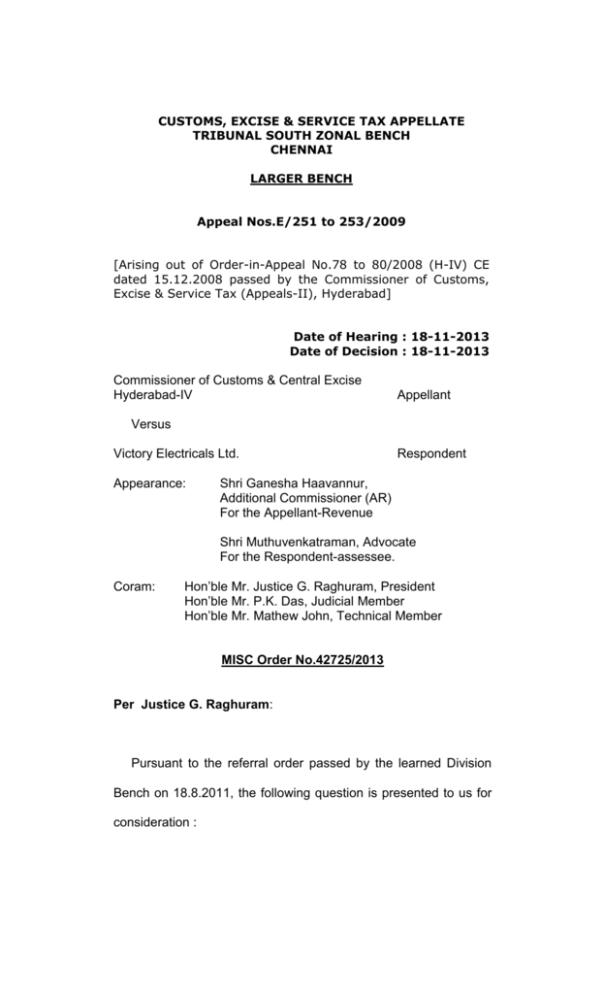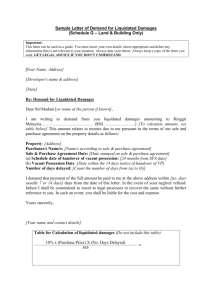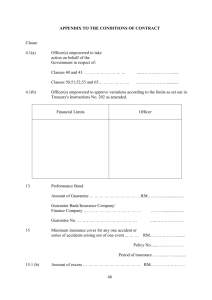18/11/2013 - Custom Excise & Service Tax Appellate Tribunal
advertisement

CUSTOMS, EXCISE & SERVICE TAX APPELLATE TRIBUNAL SOUTH ZONAL BENCH CHENNAI LARGER BENCH Appeal Nos.E/251 to 253/2009 [Arising out of Order-in-Appeal No.78 to 80/2008 (H-IV) CE dated 15.12.2008 passed by the Commissioner of Customs, Excise & Service Tax (Appeals-II), Hyderabad] Date of Hearing : 18-11-2013 Date of Decision : 18-11-2013 Commissioner of Customs & Central Excise Hyderabad-IV Appellant Versus Victory Electricals Ltd. Appearance: Respondent Shri Ganesha Haavannur, Additional Commissioner (AR) For the Appellant-Revenue Shri Muthuvenkatraman, Advocate For the Respondent-assessee. Coram: Hon’ble Mr. Justice G. Raghuram, President Hon’ble Mr. P.K. Das, Judicial Member Hon’ble Mr. Mathew John, Technical Member MISC Order No.42725/2013 Per Justice G. Raghuram: Pursuant to the referral order passed by the learned Division Bench on 18.8.2011, the following question is presented to us for consideration : 2 “Whether any deduction claimed by the buyer of excisable goods as compensation for the delay in the supply of the goods by its manufacturer (assessee) under the contract between them, during any period after 01.07.2000, is liable to be included in the assessable value of the goods under Section 4 of the Central Excise Act ?” 2. Heard Learned Additional Commissioner (AR) Shri Ganesh Haavanur for Revenue and Learned Advocate Shri Muthuvenkatraman for the assessee. 3. The transactions in issue between the assessee, the manufacturer and supplier of goods occurred subsequent to 1.7.2000 is not in dispute. Prior to 1.7.2000, Section 4 of the Central Excise Act, 1944 (the Act), in so far as is relevant for the purposes of the present case, read as follows :Section 4. Valuation of excisable goods for purposes of charging of duty of excise (1) Where under this Act, the duty of excise is chargeable on any excisable goods with reference to value, such value, shall, subject to the other provisions of this section, be deemed to be — (a) the normal price thereof, that is to say, the price at which such goods are ordinarily sold by the assessee to a buyer in the course of wholesale trade for delivery at the time and place of removal, where the buyer is not a related person and the price is the sole consideration for the sale 4. With effect from 1.7.2000, as a result of provisions of Act 10 of 2000 (Finance Act, 2000), vide Sec. 94 thereof, Section 4 of the Act was substituted. To the extent relevant and material to the present appeal, Section 4 (1) (a) of the Act, (post the amendment) reads : (1) Where under this Act, the duty of excise is chargeable on any excisable goods with reference to their value, then, on each removal of the goods, such value shall – (a) in a case where the goods are sold by the assessee, for delivery at the time and place of the removal, the assessee and the buyer of goods are not related and the price is the sole consideration for the sale, be the transaction value; 3 5. Clause (d) of Section 4 (3) defines the expression “transaction value” as follows ; “means the price actually paid or payable for the goods, when sold, and includes in addition to the amount charged as price, any amount that the buyer is liable to pay to, or on behalf of, the assessee, by reason of, or in connection with the sale, whether payable at the time of the sale or at any other time, including, but not limited to, any amount charged for, or to make provision for, advertising or publicity, marketing and selling organization expenses, storage, outward handling, servicing, warranty, commission or any other matter; but does not include the amount of duty of excise, sales tax and other taxes, if any, actually paid or actually payable on such goods.” 6. The present batch of appeals are preferred by Revenue against orders of the Commissioner (Appeals) granting refund of specified amounts of duty, to the respondent-assessee. 7. The assessee electrical was transformers. engaged During in manufacture the relevant of period, respondent supplied transformers to various Distribution Companies (discoms) of the Andhra Pradesh State Electricity Board (APSEB). Clause (2) of the purchase order provides for variation in the price, by way of revision (upward or downward) ab initio, to accommodate variations in prices of raw materials in terms delineated in the said clause. Clause (12) of the purchase order stipulates that for supplies made beyond the agreed delivery schedule, penalty shall be levied for an amount equivalent to ½ % of the value of the material not delivered within the prescribed time limit for every week of delay or part thereof, subject to a maximum of 5% of the total contract value. This clause also contains a provision 4 which enables the purchaser (APSEB) to purchase the balance quantity (undelivered within the delivery schedule) from the open market and recover the expenditure incurred thereof from the assessee. 8. The order of reference identified a conflict of opinion between decisions of the Tribunal, in United Telecom Ltd. Vs CCE Bangalore – 2006 (204) ELT 626 (Tri.-Bang.) and subsequent decisions, particularly, in CCE Noida Vs Electron Energy Equipments Ltd. – 2011 (264) ELT 153 (Tri.-Del.). There are other decisions referred to in the order of reference, which followed the decision in United Telecom Ltd. (supra). Hence the reference to the Larger Bench. 9. In MRF Ltd. Vs CCE Madras – 1997 (92) ELT 309 (SC), the Supreme Court, considering provisions of Section 4 (prior to amendment in 2000) and approving an earlier decision of this Tribunal in Indo Hacks Ltd. Vs Collector of Central Excise, Hyderabad - 1986 (25) ELT 69 (Tribunal) ruled that once the assessee had cleared the goods on the classification and price indicated by him at the time of removal of goods from the factory gate, the assessee becomes liable to payment of duty on that date and time and subsequent reduction in prices for whatever reason cannot alter the transaction value and liability to duty thereon. The court ruled that subsequent fluctuation in prices of the commodity has no relevance whatsoever so far as the liability to excise duty is concerned. This decision 5 was referred to and followed by the Punjab and Haryana High Court in Mauria Udyog Ltd. Vs CCE - 2007 (207) ELT 31 (P&H). 10. At the hearing of the reference, several other decisions were also cited on behalf of the appellantRevenue and the respondent-assessee. Hammer Ltd. In Bhartia Cutler Vs CCE New Delhi - 1998 (99) ELT 436 (Tri.), the Tribunal rejected the contention of the assessee that just as a price variation clause has the effect of increasing or reducing the originally agreed price and has a consequent impact on the assessable value, an agreement for remittance of liquidated damages has a similar effect and impacts the assessable value. The Tribunal ruled that under the contract, the parties had stipulated the time for performance; provided for breach of the contract; for payment of liquidated damages; and the mode of payment was also stipulated by providing that the amount will be deducted from the invoice. When the contract goes through, the agreed price is payable. Compensation is however payable to the buyer when there is a breach of the contract. Damages or compensation cannot therefore be regarded as the price or part of the price. The provision for deduction of the quantum of damages from the invoice price is only for the purpose of recovery of the damages; and payment of damages cannot be regarded as reduction of the agreed price. It further held that the price remained constant, namely at the agreed level and the assessee by 6 his conduct had become liable to pay damages the quantum of which was a pre-estimate in the contract and such amount of damages was liable to be deducted from the price. This would not amount to depreciation of the price. Consequently, decisions relating to the effect of a price variation clause will not apply to a situation where the price stands altered on account of application of a clause pertaining to liquidated damages, ruled the Tribunal. 11. In CCE Calicut Vs BPL Telecom Ltd. – 2003 (157) ELT 35 (Tri.-Bang.), the Tribunal following the decision in Bhartia Cutler Hammer Ltd. (supra) and Mercury Rubber Mills Vs Commissioner – 2000 (1200 ELT 413 (Tribunal), reiterated the principles enunciated in those decisions and concluded that liquidated damages being the liability of the assessee for failing to comply with certain terms of the agreement between the parties, is not an item of expenditure which can be deducted for arriving at the assessable value. 12. The Tribunal in Faridkod Cooperative Sugar Mills Ltd. Vs CCE Ludhiana – 2004 (171) ELT 174 (Tri.-Del.), followed its earlier decisions in Spring Fresh Drinks Vs Collector – 1991 (54) ELT 333 (Tribunal); Commissioner Vs Bhagwati Oxygen Ltd. – 2000 (117) ELT 647 (Tribunal) and Inox Air Products Ltd. Vs Commissioner – 2001 (134) ELT 224 (Tribunal), to hold that liquidated damages received by the assessee cannot be added to the 7 assessable value. The facts in Faridkod Cooperative Sugar Mills Ltd. were slightly distinct. The assessee was a manufacturer of molasses. One of the distilleries with which an agreement for supply of molasses was entered into did not lift the allocated quantity of molasses during the relevant period. Consequently, the assessee had to sell molasses at a lower price and thereafter received liquidated damages on account of the failure of the distillery to lift molasses as agreed upon. Revenue assumed that the amount of liquidated damages received is liable to be added to the assessable value of molasses cleared by the assessee to different purchasers, for computation of the value for levy of duty. The Tribunal concluded that liquidated damages received could not be added to the assessable value. A similar view is reiterated in KSB Pumps Ltd. – CCE Pune-I - 2007 (216) ELT 51 (Tri.Mumbai). 13. In HPL Socomac Pvt. Ltd. Vs CCE Delhi-III (Gurgaon) – 2005 (182) ELT 191 (Tri.-Del.), Tribunal ruled that the original assessment and payment of duty took place at the contracted price; the change in the amount paid is on account of imposition of penalty for delayed delievery; and since penalty is separate from the price of the goods, there being no provision in excise law for allowing deduction of penalty from the sale price for the purpose of ascertaining the assessable value, no refund is liable to be paid. In such a case, the price would not stand altered by imposing the 8 penalty agreed upon between the purchaser and seller for delayed delivery, held the Tribunal. 14. United Telecom Ltd. (supra), is the only authority which specifically refers to the definition of “transaction value” in section 4 (3) (d) of the Finance Act, 1994. In this case, the appellant-assessee was a manufacturer of telecom equipment which was supplied to BSNL. Assessee filed a refund claim on the basis of difference in price quoted in the purchase order and invoices under the cover of which the goods were cleared, resulting in liquidated damages applied by BSNL for delayed delivery of the goods. Revenue rejected the claim for refund on the ground that liquidated damages administered by the purchaser was not an abatable discount in the “transaction value”, in terms of the definition of expression in Section 4 (3) (d). Considering the issue in the context of amended provisions of Section 4 and the definition of “transaction value” under Section 4 (3) (d), the Tribunal recognized the distinction between “penalty” and “liquidated damages”; culled out the relevant principles in relation to whether a sum stipulated for delayed delivery in a contract is a stipulation by way of a “penalty” or “liquidated damages”, by reference to precedents and textual authority viz. Chitty on Contracts and an extract from “Mcgregor on Damages” and concluded that the relevant clause in the agreement between the parties authorizes the purchaser to remit an amount lesser than the normally agreed price for delayed 9 supplies. The Tribunal concluded that in the circumstances the clause must be considered a penalty and was not in the nature of a stipulation in terrorem. The stipulation was clearly in the nature of liquidated damages and not penalty, ruled the Tribunal. After referring to the definition of the expression “transaction value” under Section 4 (3) (d) of the Act, the Tribunal held that the definition of the term “transaction value” represents the price actually paid or payable for the goods. In that case, even though a price is fixed for the goods, qua the contract, the goods are required to be delivered on a particular date and if there is delay in delivery, the price is reduced depending on the delay. As a result of such adjustments, the assessee received a lesser payment, which was the transaction value. On this factual basis, the Tribunal concluded that the provision in the contract, for variation in the price by application of the clause, was related to liquidated damages and the same is in the nature of a compensation payable for delayed delivery in the supply of goods and not in the nature of penalty. The Tribunal concluded that in terms of the definition of “transaction value”, duty is payable only on the price arrived at by taking into account the liquidated damages. The appeal was allowed, in favour of the assessee. 15. This decision was followed by this Tribunal in CCE Chandigarh Vs HFCL (supra), another case involving application of liquidated damages resulting in alteration of 10 transaction value. Commissioner (Appeals) allowed the refund claim of the assessee and Revenue was in appeal. The relevant clause of the agreement between the parties was interpreted not as a clause in the nature of a threat, fixed in terrorem of the other party but as a clause stipulating “liquidated damages”. As a consequence, the transaction value gets reduced on application of liquidated damages wherever the supplies were made beyond the normal stipulated period of delivery, concluded the Tribunal. 16. Section 4 read with the definition of “transaction value” in Section 4 (3) (d) enables levy of duty on the transaction value paid or payable for the goods. The value payable in a case where liquidated damages is applied would therefore be the consequent value and this would constitute the “transaction value” . 17. Except the decision of United Telecom (supra) followed in HFCL (supra) which are clearly and apparently after due consideration of provisions of the amended Section 4 read with definition of “transaction value” in Section 4 (3) (d), other decisions adverted to above were either on the basis of provisions of Section 4 prior to its amendment by Finance Act, 2000 or without analysis of provisions of the amended Section 4 and the distinct concepts of “penalty” and “liquidated damages”, pointed out in United Telecom Ltd. 11 18. The decision in Electron Energy Equipments Ltd. (supra), which is in conflict with the decision in United Telecom Ltd. (noticed by the referral order), is subsequent to amendment of Section 4 vide the Finance Act, 2000. However, this decision did not proceed on any analysis of the amended provisions of Section 4 or due consideration of the definition of “transaction value” in Section 4 (3) (d). It proceeded merely on the premise that deduction of penalty/liquidated damages in terms of provisions of the agreement between the parties, from the agreed price on account of delay in delivery, would not entitle deductions for the purpose of ascertaining the transaction value. 19. In our considered view, post the amendment of Section 4 and the statutory definition of ‘transaction value’ in sub-section (3) (d) thereof, of the Act, the eventual value payable after factoring in any liquidated damages contractually stipulated for delayed supply would be the transaction value and this value would be the value relevant for levy of duty. 20. On the aforesaid analysis, we answer the reference by holding that wherever the assessee, as per the terms of the contract and on account of delay in delivery of manufactured goods is liable to pay a lesser amount than the generically agreed price as a result of a clause (in the agreement), stipulating variation in the price, on account a the liability to “liquidated damages”, irrespective of whether the clause is titled “penalty” or “liquidated 12 damages”, the resultant price would be the “transaction value”; and such value shall be liable to levy of excise duty, at the applicable rate. 21. The substantive appeals are remitted to the regular Bench for disposal on merits and in terms of the reference answered as above. (Dictated and pronounced in open court) (JUSTICE G.RAGHURAM) PRESIDENT (P.K.DAS) JUDICIAL MEMBER (MATHEW JOHN) TECHNICAL MEMBER gs






